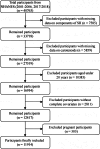Significant association of serum carotenoids with the systemic immune-inflammation index: A cross-sectional study based on NHANES
- PMID: 40550055
- PMCID: PMC12187323
- DOI: 10.1097/MD.0000000000042942
Significant association of serum carotenoids with the systemic immune-inflammation index: A cross-sectional study based on NHANES
Abstract
The systemic immune-inflammation index (SII) is an emerging inflammatory marker. Carotenoids have anti-inflammatory properties. Therefore, this study aims to explore the association of serum carotenoids with SII. This cross-sectional study analyzed data from the 2001 to 2006 and 2017 to 2018 cycles of National Health and Nutrition Examination Survey. Multivariate linear regression models were employed to evaluate the relationship. Restricted cubic splines models were used to assess potential nonlinear relationships. Subgroup analyses and sensitivity analysis were also performed. Our study included 11,914 eligible participants. After adjusting for all covariates, the total carotenoids levels showed a negative correlation with SII (P < .001). Furthermore, the levels of α-carotene, β-carotene, β-cryptoxanthin, and lutein/zeaxanthin still had significant negative associations (all P < .001). Specifically, individuals in the highest quartile of α-carotene, β-carotene, β-cryptoxanthin, lutein/zeaxanthin, and lycopene had lower SII levels compared to those in the lowest quartile (all P < .05). Nonlinear relationships were observed between total carotenoids, α-carotene, β-carotene, β-cryptoxanthin, lutein/zeaxanthin, and SII (all P < .05), while a linear relationship between lycopene and SII was found (P = .070). Subgroup analyses and sensitivity analysis indicated that the results were robust. This study reveals a significant negative association between serum carotenoids and SII, highlighting the potential anti-inflammatory role of carotenoids.
Keywords: NHANES; carotenoids; inflammation; systemic immune-inflammation index.
Copyright © 2025 the Author(s). Published by Wolters Kluwer Health, Inc.
Conflict of interest statement
The authors have no funding and conflicts of interest to disclose.
Figures



Similar articles
-
Dietary Intake of Beta Cryptoxanthin, but not Other Carotenoids, Is Associated With Less Frequent Anxiety Symptoms in US Adults: A Cross-Sectional Analysis of the National Health and Nutrition Examination Surveys 2007 Through 2012.J Acad Nutr Diet. 2025 Aug;125(8):1177-1187.e1. doi: 10.1016/j.jand.2025.03.001. Epub 2025 Mar 6. J Acad Nutr Diet. 2025. PMID: 40057029
-
Higher serum carotenoid concentrations are associated with lower mortality in adults with advanced cardiovascular-kidney-metabolic syndrome.Nutr Res. 2025 Aug;140:34-45. doi: 10.1016/j.nutres.2025.06.002. Epub 2025 Jun 12. Nutr Res. 2025. PMID: 40617233
-
The Association between Circulating Carotenoids and Risk of Breast Cancer: A Systematic Review and Dose-Response Meta-Analysis of Prospective Studies.Adv Nutr. 2024 Jan;15(1):100135. doi: 10.1016/j.advnut.2023.10.007. Epub 2023 Oct 30. Adv Nutr. 2024. PMID: 38436219 Free PMC article.
-
Inverse relationship between serum carotenoid levels and obesity prevalence in children and adolescents: a nationwide cross-sectional analysis.BMC Pediatr. 2025 Aug 10;25(1):617. doi: 10.1186/s12887-025-05983-0. BMC Pediatr. 2025. PMID: 40784950 Free PMC article.
-
Antioxidant vitamin and mineral supplements for slowing the progression of age-related macular degeneration.Cochrane Database Syst Rev. 2023 Sep 13;9(9):CD000254. doi: 10.1002/14651858.CD000254.pub5. Cochrane Database Syst Rev. 2023. PMID: 37702300 Free PMC article.
References
-
- Fakhoury M. Role of immunity and inflammation in the pathophysiology of neurodegenerative diseases. Neurodegener Dis. 2015;15:63–9. - PubMed
MeSH terms
Substances
LinkOut - more resources
Full Text Sources

